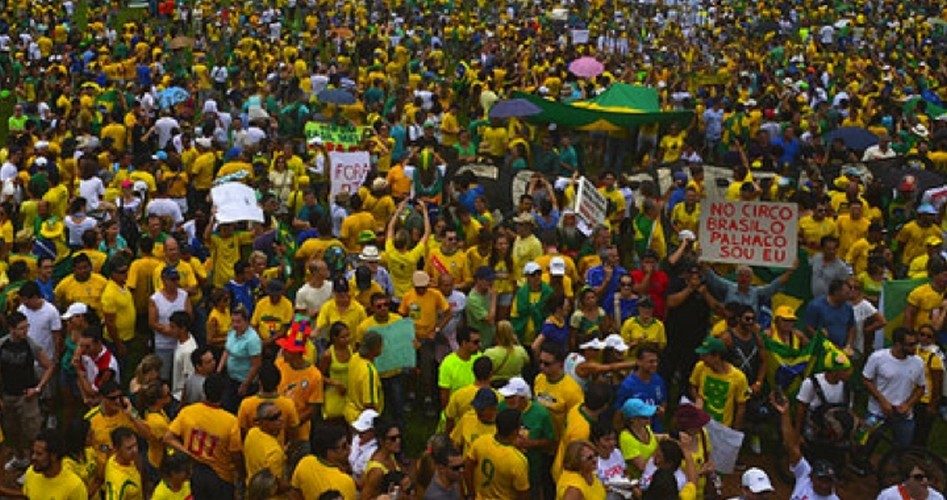
After barely squeaking out a reelection victory last October in one of the country’s closest elections in modern times, Brazil’s President Dilma Rousseff now is the target of massive protests calling for her ouster. On Sunday, March 15, protests that had been building for days culminated in mass demonstrations that brought a reported 1.5 million protesters into the streets. The French news agency AFP reported that, according to police sources, over one million people rallied in São Paulo, Latin America’s largest city and Brazil’s central business and industry hub. Hundreds of thousands more marched in 83 cities shouting “Basta!” (Enough!) and demanding “Dilma Out!”
Brazil, which boasts the largest economy in Latin America, the second largest economy in the western hemisphere (behind only the United States), and the seventh largest in the world (by nominal GDP and purchasing power parity) was touted as an economic powerhouse over the past decade. Now, however, the unsustainable policies of its socialist government, which has been rampant with corruption, have sent the economy into a tailspin. Soaring inflation and unemployment are accompanying a national recession. A recent report by the Economist entitled “Brazil’s Coming Recession: The Crash of a Titan” noted, “Investment, which rose in eight of the ten years to 2013, often substantially, will sink in 2015. Petrobras, the partially state-owned oil giant that is Brazil’s largest investor, is mired in a corruption scandal that has paralysed spending: the affair may cost up to 1% of GDP in forgone investment. On February 24th Moody’s, a credit-rating agency, cut its debt to junk status; if Petrobras fails to publish audited results soon it may be unable to borrow at all.”
“Brazil’s parlous finances leave no room for debt-financed stimulus,” the Economist review continues. “At 66% of GDP its gross public debt is the highest of the BRIC countries. Its bonds yield 13% — more than Russia’s. Rates could rise further. Fitch, a credit-rating agency, puts Brazil one notch above junk, but it has more debt, bigger deficits and higher interest rates than most countries in that category. If growth evaporates, a downgrade would be a certainty, raising debt costs even more.”
Adding to Rousseff’s woes, on March 16 Brazilian prosecutors formally charged Joao Vaccari, the treasurer of her ruling Workers’ Party, and 26 others with corruption linked to the state-run Petrobras. The prosecutors accuse Vaccari of soliciting donations from former Petrobras services chief Renato Duque and other executives who allegedly funneled money from the oil company into party coffers.
President Dilma Rousseff, like President Obama, is the beneficiary of extraordinary treatment by the establishment world press. In fact, the favorable makeover she has received from the media is even more striking. While Obama has ties to communist Weather Underground terrorist Bill Ayers, Communist Party organizer Frank Marshall Davis, Marxist organizer/strategist Saul Alinsky, and many other subversives, Rousseff was herself a gun-toting communist revolutionary, a leader in a terrorist group that, in the 1960s, carried out bombings, bank robberies, and murder (see here and here). After serving under Brazilian President (and communist Workers Party chief) Lula da Silva, Rousseff moved up to take both positions from the retiring Lula. In addition, she has been a leading light in the São Paulo Forum (SPF), a global terrorist cabal organized by her pal Fidel Castro and only lightly disguised as a political forum.
However, Dilma Rousseff’s comrades in the global media choir may not be able to cover for her much longer; economic realities may outstrip their ability to spin a positive image for Brazil’s Red Queen.
Related articles:
Communist Regime-financing Ex-Im Bank Fights for Survival
After Brazil Election, Obama Vows Closer Ties With Radical Ruler
“Moderate” President of Brazil Rallies Communist Party Allies



